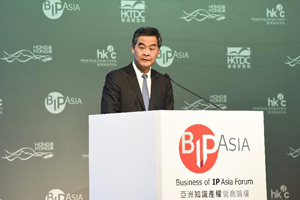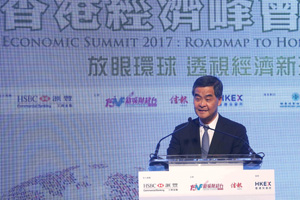
|
The Hong Kong economy will scale new heights!The four forums that I spoke at yesterday were all related to the Hong Kong economy. Two of them were about two emerging and promising industries in Hong Kong. The first one was the Business of Design Week held early yesterday morning. This week-long event, which celebrated its 15th edition, was organised in partnership with Chicago this year. The event attracted 100 000 people and 70 speakers from all over the world. Design is part of the cultural and creative industry, which contributes US$14 billion annually to our gross domestic product and employs 5.7% of the total workforce in Hong Kong. The industry is by no means a small one, although it may be unfamiliar to some people because it is not commonplace in daily life and is not frequently reported by the media. The second event which I spoke at was the Business of Intellectual Property (IP) Asia Forum. This two-day event, featuring 80 speakers, was attended by 2 800 people, of whom 700 were from Hong Kong, 700 from the Mainland and 1 400 from overseas. As illustrated by the word "business" in the titles of these two events, both design and IP have economic values. Each can form an economic sector. Nowadays, China has overtaken the United States as the country with the highest number of new IP rights registrations in the world, and the number is growing rapidly each year. So, what should Hong Kong do? We should leverage our established strengths - including the rule of law, a world-class business environment and a biliterate and trilingual population - to develop IP agency business, such as IP valuation, financing, trading, leasing, licensing, franchising and copyright trading. Given the uncertainties in the global economy in the coming year, there is all the more reason for the Government to stay vigilant and boost our strengths by promoting economic development. We cannot afford to rest on our laurels. Internally, we must diversify our economic base, including developing the design and IP sectors as mentioned above. We must help various industries move up the value chain through, but not limited to, "re-industrialisation". Efforts should also be made to nurture the innovation and technology industry and encourage the development of high valued-added manufacturing industries, such as advanced manufacturing. Externally, we must identify new opportunities outside Hong Kong, including Mainland China and the rest of the world. We should keep our confidence as we have advantages on both fronts. But instead of doing nothing and just leaving it to chance, we must act swiftly. We are pleased to note a growing interest in innovation and technology in the community. We are seeing more media reports on Hong Kong's innovation, technological and scientific developments. The numbers of start-ups, incubators and co-working spaces have been increasing. Enterprises and investors now attach greater importance to scientific research and technology application. According to the latest statistics of Invest Hong Kong, there are currently some 2 000 innovation and technology start-ups in Hong Kong. This represents a 24% increase over last year, with 40% coming from places outside Hong Kong. In addition, there are nearly 50 incubators, co-working spaces and accelerators in the city. To develop innovation and technology, we need land. Hong Kong people are creative and enterprising, but exorbitant rents have stifled their bids to set up companies and affected business operations. In view of this, the current-term Government has made all-out efforts to increase land and building supply. We will need to tackle not only the housing problem but also the difficulties that Hong Kong people encounter in starting and operating businesses. In the short run, 8 million square feet of commercial and office space in Kowloon East near the former Kai Tak Airport will be provided in the coming five years. As for long-term measures, the Government launched in October this year a public engagement exercise entitled "Hong Kong 2030+", which aims to guide planning, land and infrastructure development and shape the built environment of Hong Kong beyond 2030. We should abandon short-sighted thinking and the approach of taking merely short-term actions as in the past. The above is about the internal development of Hong Kong. Let us now turn to opportunities outside Hong Kong. What has been the driving force behind the Hong Kong economy over the past three to four decades? The answer is "reform and opening up". It was the country's reform and opening up that helped Hong Kong businesses develop into nationwide enterprises. In the next three to four decades, in addition to making good use of the country's reform and opening up, we must also seize the opportunities presented by the Belt and Road Initiative. Indeed, "reform and opening up" and "Belt and Road Initiative" will be the two engines propelling Hong Kong's economic development in the coming 30 to 40 years. The way I and my Government see it, Hong Kong should position itself as the "super-connector" between Mainland China and the rest of the world. Under "one country, two systems", Hong Kong has a unique role to play. Compared with overseas cities, we have the "China advantage" - that is, the "one country" advantage. Compared with Mainland cities, we have the "two systems" advantage. If we can capitalise on the combined advantages of "one country" and "two systems", we can serve as a "super-connector" between Mainland China and other countries. We can "go global" together with Mainland enterprises, especially in exploring markets in the Belt and Road countries. Our "super-connector" role is not limited to finance, but also covers trade, maritime services, logistics, professional services as well as technology, culture, education, information technology and design. All these will bring new opportunities for Hong Kong's economic development. The global economy is undergoing sweeping changes. In spite of increasing international competition, the advocacy role and leading status of China in global economic affairs are becoming more and more evident. So are the advantages that Hong Kong enjoys under "one country, two systems". With our institutional advantages, staunch support from our country, a solid foundation and our strong capabilities, I am confident that our economy will scale new heights as long as the Government and the whole community dare to take bold actions and seize the upcoming opportunities.
December 2, 2016
|
||||||||||||||||||||||||||
|







